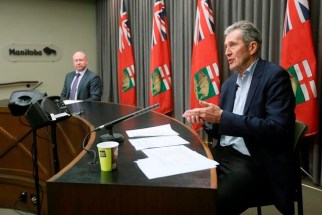Pandemic response must be quick and creative
Read this article for free:
or
Already have an account? Log in here »
To continue reading, please subscribe:
Monthly Digital Subscription
$0 for the first 4 weeks*
- Enjoy unlimited reading on winnipegfreepress.com
- Read the E-Edition, our digital replica newspaper
- Access News Break, our award-winning app
- Play interactive puzzles
*No charge for 4 weeks then price increases to the regular rate of $19.00 plus GST every four weeks. Offer available to new and qualified returning subscribers only. Cancel any time.
Monthly Digital Subscription
$4.75/week*
- Enjoy unlimited reading on winnipegfreepress.com
- Read the E-Edition, our digital replica newspaper
- Access News Break, our award-winning app
- Play interactive puzzles
*Billed as $19 plus GST every four weeks. Cancel any time.
To continue reading, please subscribe:
Add Free Press access to your Brandon Sun subscription for only an additional
$1 for the first 4 weeks*
*Your next subscription payment will increase by $1.00 and you will be charged $16.99 plus GST for four weeks. After four weeks, your payment will increase to $23.99 plus GST every four weeks.
Read unlimited articles for free today:
or
Already have an account? Log in here »
Hey there, time traveller!
This article was published 01/04/2020 (2082 days ago), so information in it may no longer be current.
There’s probably never been a time in recent history when governments have had to make as much policy on the fly as we’re seeing with the COVID-19 outbreak.
That’s not a criticism of policy makers and the experts they rely on. It’s an unavoidable reality.
The speed at which the novel coronavirus pandemic has gripped the world in recent weeks is without precedent. There is no playbook to fight it. There have been world wars, pandemics and other international crises that have forced societies and governments to take extreme actions to save lives, mitigate economic disaster and preserve nation-states. But none has happened this quickly.
In a fast-paced world where people and goods circulate the globe at lightning speed, communicable diseases can now spread just as fast. The need to respond quickly – especially when hundreds of thousands, perhaps millions, of lives are at stake – has never been more pressing.
Acting on the “best available evidence” is the stated mantra of politicians, public health officials and epidemiologists in the war against COVID-19. But even that can be a flimsy guide when public health standards seem to be in a state of flux (wear a mask? don’t wear a mask?) and scientific evidence about the disease (how much do asymptomatic carriers really spread the virus?) is evolving rapidly.
What it means is public health officials, and the infectious disease experts they rely on, have to adapt and modify their policies on an ongoing basis. Sometimes they get it right, sometime they don’t.
It’s difficult enough to manage a health care crisis of this magnitude. It’s even more challenging when knowledge about the disease changes almost weekly.
What it means is public health officials, and the infectious disease experts they rely on, have to adapt and modify their policies on an ongoing basis. Sometimes they get it right, sometime they don’t.
It’s easy to criticize after the fact. There is no shortage of armchair quarterbacks right now who, even though they have no background in public health or epidemiology, believe they know better than the experts. Why didn’t government take some action earlier? Why isn’t Manitoba testing more? Why aren’t we doing things other jurisdictions are? Why didn’t the province shut down non-essential businesses sooner?
They’re all reasonable questions (most of which have logical answers). But they get asked daily because the goal posts keep shifting. It’s uncharted territory. While provincial officials do their best to adhere to whatever “best practices” exist to prepare and respond to the pandemic, most of what they’re dealing with is new.
As Manitoba gets more COVID-19 cases (there are now early signs of community transmission), rules will continue to change, including tightening the screws on social distancing measures. It will inevitably raise more questions about why those actions weren’t taken sooner.
It’s the same with measures by governments to mitigate the economic crisis caused by the pandemic.
There’s little doubt massive government intervention is required to save as many businesses and organizations as possible to avoid a complete collapse of the economy. But how to do it? Government has never faced a crisis like this before. There is no roadmap to guide them.
The federal government has rolled out several measures in recent weeks, including a 75 per cent wage subsidy program. The objective is to avoid layoffs by subsidizing wages directly.
The provincial government has still not stepped up to the plate with an economic action plan of its own. They have announced some small measures, like a rent freeze and a ban on most evictions for renters.
Is it perfect? No, it was created on the fly after consultations with business groups. There are still many questions about how the subsidies work, including why some companies won’t qualify. It’s also not enough to save some organizations whose revenues have completely dried up. A wage subsidy won’t help them.
Nevertheless, the federal government should be given credit for trying. They will, in all likelihood, make changes to the program as time goes on.
The provincial government has still not stepped up to the plate with an economic action plan of its own. They have announced some small measures, like a rent freeze and a ban on most evictions for renters. But they need to supplement what Ottawa is doing to help save businesses. Otherwise, we won’t have much of an economy left when the virus is finally wrestled to the ground.
It’s time for creative solutions from all levels of government. It’s one of the rare moments in history when making policy on the fly can’t be avoided.
tom.brodbeck@freepress.mb.ca

Tom has been covering Manitoba politics since the early 1990s and joined the Winnipeg Free Press news team in 2019.
Our newsroom depends on a growing audience of readers to power our journalism. If you are not a paid reader, please consider becoming a subscriber.
Our newsroom depends on its audience of readers to power our journalism. Thank you for your support.






